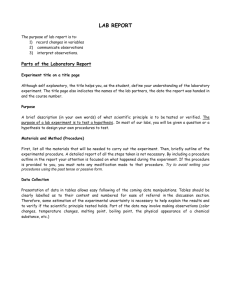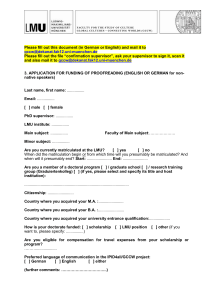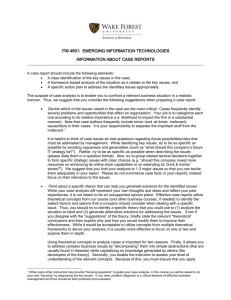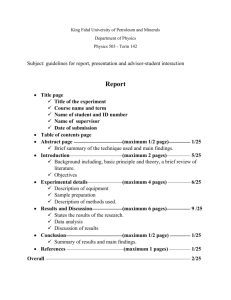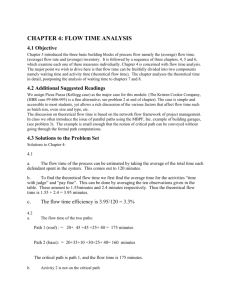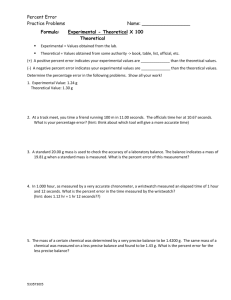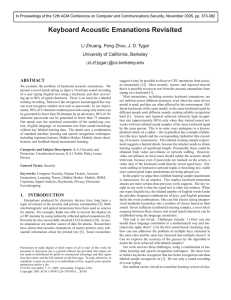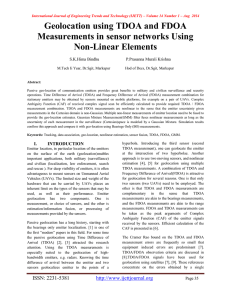Slides
advertisement
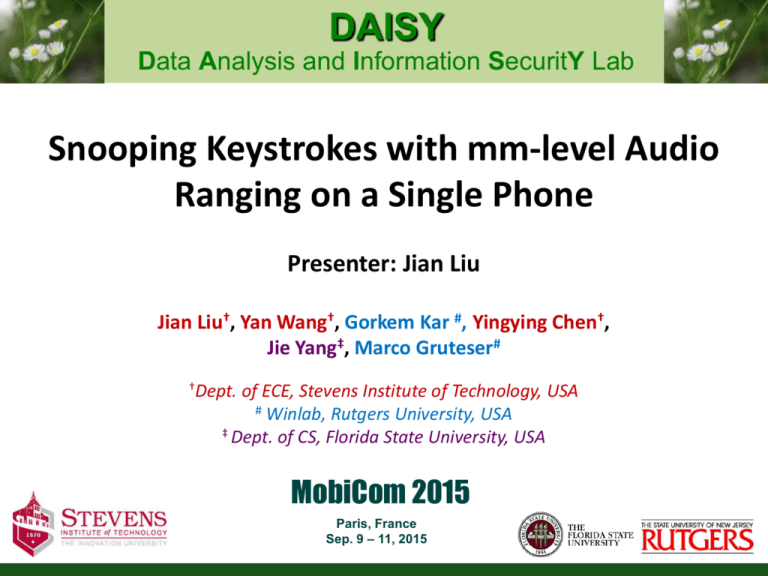
DAISY Data Analysis and Information SecuritY Lab Snooping Keystrokes with mm-level Audio Ranging on a Single Phone Presenter: Jian Liu Jian Liu†, Yan Wang†, Gorkem Kar #, Yingying Chen†, Jie Yang‡, Marco Gruteser# †Dept. of ECE, Stevens Institute of Technology, USA # Winlab, Rutgers University, USA ‡ Dept. of CS, Florida State University, USA MobiCom 2015 Paris, France Sep. 9 – 11, 2015 Mobile Device Hardware Advancements High definition audio capabilities targeted at audiophiles Microphone arrays (stereo recording & noise canceling) 4x improvement in audio sampling rates Mic-1 Stereo recording Mic-2 Such advancements have security concerns 2 Mic-3 Audio chipset: 192kHz playback and recording The Results of the Advancements Facilitating fine-grained localization based applications Tracking speakers in multiparty conversations Sensing touch interaction on surfaces around mobile devices Eavesdropping keystrokes without suspicion Adding malware into the target user’s phone with microphone access Leaving a phone near a keyboard of the target user Adding malware with Mics access 3 Leaving a phone Be careful of these nearby phone! They can hear your typing! 4 Related Work Label each key training devices Multiplefor recording Linguistic context Multi-phone Training with labeled data to be placed require a-priori labeled training around data typing has to satisfy English language pattern 5 Our Approach No linguistic model No labeled training (e.g., without any cooperation of the target user) No involvement of multiple phones 6 Available Audio Components in a Single Phone Stereo recording of two microphones High sampling rate Stereo 1 Mic1 Stereo 2 Noise Cancellation Stereo recording Mic2 7 Mic3 What can we obtain from the dual-Mic in a phone to snoop keystrokes? 8 Feature 1: Time Difference of Arrival (TDoA) Theoretical TDoA Measured TDoA Mic1 Distance t1=t difference t1=t’Δd2 Distance difference Δd1 ` S Mic2 t2=t+Δt t2=t’+Δt’ L Most of the keys could be differentiated by the TDoAs 9 Limits of Measured TDoA Dual-Microphone TDoA can only identify a group of keystrokes Half hyperbola of constant TDoA Mic2 d Mic1 r1 r2 TDoA = Δt r1 – r2 = Δt·v Measured TDoA has the Resolution Limited by Sampling Rate Sampling by ADC Speed of sound: 343m/s 10 Feature 2: Acoustic Signature Keystrokes of different keys sound different MFCCs (Mel-frequency Cepstral Coefficients) can be used to discriminate sounds of different keys MFCC of key ‘E’ MFCC of key ‘D’ 11 MFCC of key ‘X’ We can combine TDoA and acoustic signatures to identify each keystroke! 12 System Overview A Set of Keystrokes Keystroke Detection & Segmentation TDoA Derivation Grouping of Keystrokes Acoustic Signature Extraction MFCC-based Clustering with in a Group Cluster-based Letter Labeling Identified Keystrokes 13 Key Groups Generation Theoretical Key Groups Theoretical TDoA Theoretical Key Groups A theoretical key group – keys having similar theoretical TDoAs Link any pair of keys whose Sorting theoretical TDoAs are too similar Q W E R T Y U I O P A S D F G H J K L Z X C V B N M One theoretical key group 14 Keystroke Grouping [sp − 5ms, sp + 100ms], where Input sp iskeystrokes starting point A Set of Keystrokes Cross-correlation approach Keystroke Detection & Segmentation TDoA Derivation Grouping of Keystrokes Theoretical Key Groups g1 g2 g3 gn Theoretical key groups 15 Clustering within Each Group & Labeling Keystroke clusters Acoustic Signature Extraction MFCC-based Clustering with in a Group Theoretical TDoA Cluster-based Letter Labeling Each cluster contains keystrokes of the same key t1 t2 t3 clustering Mean TDoAs Identified Keystrokes MFCC features: same key shows higher correlation, while different keys lower correlation Findingpresent Minimum Theoretical A theoretical key group: Distance keystrokes of multiple keys with similar TDoAs E 16 D TDoA X Labeling Evaluation How robust is the system recovering keystrokes from different keyboards? What is the performance with different sampling rates? How does the placement of the phone influence the snooping accuracy? 17 Experimental Setup Phone/Recording Device Samsung Galaxy Note 3 (48kHz) External microphones (96/192kHz) 15.3cm Keyboards Three keyboards with different keystroke sound intensity levels Apple MC184LL/A Microsoft Surface 18 Razer Black Widow Ultimate Experimental Setup Data collection Randomly type the 26 keys a-z on keyboards In typical office environments with ambient noise (e.g., heater, airconditioner) 3,640 keystrokes are collected Placements Three typical placements Evaluation Metric Top-k Accuracy - identify k candidate keys for each keystroke - whether the pressed keys are among identified key candidates 19 Overall Performance k=1 k=2 k=3 Top-k Accuracy 1 0.8 0.6 0.4 0.2 0 Apple Wireless Microsoft Surface Razer Blackwidow Average Accuracy Average Top-1 Accuracy: 86% Average Top-2 Accuracy: 95% Average Top-3 Accuracy: 98% All three keyboards have comparable high accuracies 20 Impact of Sampling Rates k=1 k=2 k=3 Top-k Accuracy 1 0.9 0.8 0.7 0.6 0.5 48 Top-1 Accuracies 96 192 Sampling Rate (kHz) 48kHz: 85% 96kHz: 86% 192kHz: 94% Higher sampling rate improves the recognition accuracy 21 Show that a single phone can recover keystrokes by exploiting mm-level TDoA ranging and fine-grained acoustic features Develop a training-free approach on a single phone that does not require a linguistic model to snoop keystrokes Extensive experiments with different keyboards & microphones sampling rates demonstrate that our work could achieve sufficient accuracy for keystroke snooping 22 DAISY Data Analysis and Information SecuritY Lab Thank you! Jian Liu jliu28@stevens.edu http://personal.stevens.edu/~jliu28/ 23

